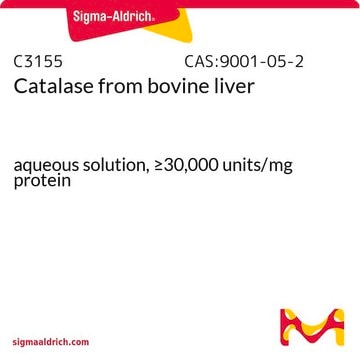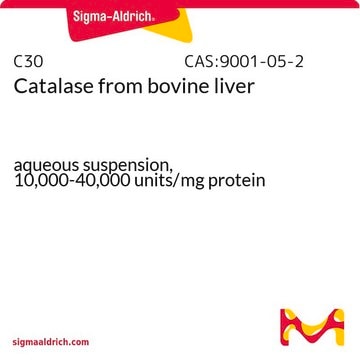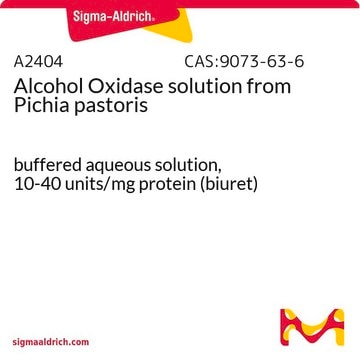P4234
Pyranose Oxidase from Coriolus sp.
recombinant, expressed in E. coli, ≥2.7 units/mg solid
Sinónimos:
Pyranose: Oxygen 2-Oxidoreductase
Iniciar sesiónpara Ver la Fijación de precios por contrato y de la organización
About This Item
Número de CAS:
MDL number:
UNSPSC Code:
12352204
NACRES:
NA.54
Productos recomendados
recombinant
expressed in E. coli
Quality Level
form
powder
specific activity
≥2.7 units/mg solid
shipped in
wet ice
storage temp.
−20°C
General description
Pyranose oxidase (P2O), a homotetrameric protein consists of a covalently bound flavin adenine dinucleotide (FAD). It is seen mostly among wood-degrading basidiomycetes.
Application
Pyranose Oxidase from Coriolus sp. has been used in the enzymatic oxidation of D-glucose (DG). It has also been used as a component in oxygen scavenging system (OSS) to increase the lifetime of the fluorophores.
Biochem/physiol Actions
Pyranose oxidase (P2O) can be used in clinical chemistry to determine 1,5-anhydro-d-glucitol marker, used for glycemic control in diabetes patients.
Pyranose oxidase (P2O) catalyzes the oxidation of aldopyranoses at position C-2 to yield the corresponding 2-ketoaldoses. The in vivo substrates of P2O are thought to be D-glucose, D-galactose, and D-xylose. They are oxidized to 2-keto-D-glucose (D-arabino-hexos-2-ulose, 2-dehydro-D-glucose), 2-keto-D-galactose (D-lyxo-hexos-2-ulose, 2-dehydro-D-galactose), and 2-keto-D-xylose (D-threopentos-2-ulose, 2-dehydro-D-xylose), respectively. Pyranose oxidase has significant activity with carbohydrates such as, L-sorbose, D-glucono-1,5-lactone, and D-allose. When pyranose oxidase catalyzes the oxidation of aldopyranoses, electrons are transferred to molecular oxygen which results in the formation of hydrogen peroxide.
Unit Definition
One unit produces 1.0 μmol of hydrogen peroxide per minute at 37 °C, pH 7.0.
Other Notes
Contains glutamate
signalword
Danger
hcodes
pcodes
Hazard Classifications
Resp. Sens. 1
Storage Class
11 - Combustible Solids
wgk_germany
WGK 1
flash_point_f
Not applicable
flash_point_c
Not applicable
Certificados de análisis (COA)
Busque Certificados de análisis (COA) introduciendo el número de lote del producto. Los números de lote se encuentran en la etiqueta del producto después de las palabras «Lot» o «Batch»
¿Ya tiene este producto?
Encuentre la documentación para los productos que ha comprado recientemente en la Biblioteca de documentos.
Los clientes también vieron
Purification and Characterization of Pyranose Oxidase from the White Rot Fungus Trametes multicolor
Leitner C, et al.
Applied and Environmental Microbiology, 67(8), 3636-3636 (2001)
Tien-Chye Tan et al.
Journal of molecular biology, 402(3), 578-594 (2010-08-17)
Flavoenzymes perform a wide range of redox reactions in nature, and a subclass of flavoenzymes carry covalently bound cofactor. The enzyme-flavin bond helps to increase the flavin's redox potential to facilitate substrate oxidation in several oxidases. The formation of the
Purification and characterization of pyranose oxidase from the white rot fungus Trametes multicolor.
C Leitner et al.
Applied and environmental microbiology, 67(8), 3636-3644 (2001-07-27)
We purified an intracellular pyranose oxidase from mycelial extracts of the white rot fungus Trametes multicolor by using ammonium sulfate fractionation, hydrophobic interaction, ion-exchange chromatography, and gel filtration. The native enzyme has a molecular mass of 270 kDa as determined
Mor R Alkaslasi et al.
Nature communications, 12(1), 2471-2471 (2021-05-02)
In vertebrates, motor control relies on cholinergic neurons in the spinal cord that have been extensively studied over the past hundred years, yet the full heterogeneity of these neurons and their different functional roles in the adult remain to be
Tien-Chye Tan et al.
Journal of molecular biology, 409(4), 588-600 (2011-04-26)
Trametes multicolor pyranose 2-oxidase (P2O) is a flavoprotein oxidase that oxidizes d-glucose at C2 to 2-keto-d-glucose by a highly regioselective mechanism. In this work, fluorinated sugar substrates were used as mechanistic probes to investigate the basis of regioselectivity in P2O.
Nuestro equipo de científicos tiene experiencia en todas las áreas de investigación: Ciencias de la vida, Ciencia de los materiales, Síntesis química, Cromatografía, Analítica y muchas otras.
Póngase en contacto con el Servicio técnico











